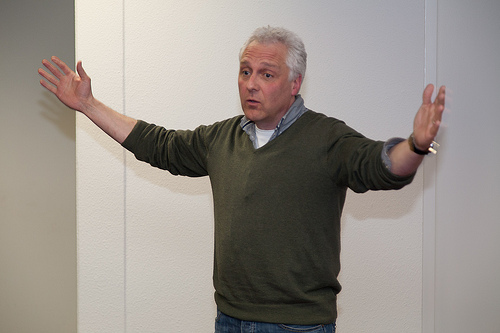If Christian traditions exist to help us remember things that should never be forgotten, such as the grace of God, the life and passion of Christ, the promises of forgiveness and new life, then what is the role of the preacher in preserving memories?
As a storyteller.
My confirmation students have noticed that when I really want to drive home a point, whether in a sermon or confirmation class, I never repeat what I just said, for added emphasis. (Although pastors have been doing this for years, it is more annoying than effective.)
I don’t quote a Bible verse. I do not report on a biblical event. I don’t give a definition or an explanation. I don’t make a joke or quote a witty saying. I do not wax eloquent or attempt poetry.
I do not get louder or more intense, or stress that what I’m saying now is really important!!!
When I want to drive home a point, I try to do what great communicators such as Jesus, Abraham Lincoln, and Aesop did. I tell a story.
We all notice from the pulpit on Sunday the fluttering eyelids of the older gentleman who needs frequent naps, the professional who was on call late last night, and the teen who is overbooked and easily distracted. Do you notice how they perk up in the pew as soon as we begin a story? Their glazed or hooded eyes sharpen into focus. They sit forward in their seats, wanting to hear what comes next.
A good story has this effect because it is a magical means of transport. It does not just speak of a different time or place; it instantly carries us to a different place or time. Being transported to a different place or time is not something that leaves us bored, indifferent, or unaffected. This is especially true if something dramatic is happening in this new time and place, and things worth remembering are always dramatic.
A good story is a balancing act. It provides enough detail to make the transport real without giving so much that the drama and tension bog down and listener would just as soon go back to his own time and place.
Stories work in the pulpit because preaching is an oral form of communication, and stories are most effective when communicated orally. Sure, many of us love to read long epic stories. However, there are many folks in our congregation that don’t like to read at all.
I have never met anyone who can resist listening to a short, well-told story.
A rhetorical device that can hold our interest and carry us back in time is the ideal medium for helping us remember what should never be forgotten. A sermon story forces us to remember by allowing us to actually experience something of that event in the past that we must never forget.
We are far more likely to remember an event that we experience than one that we are told about.
Preaching can be complicated, stressful, and frustrating when we get hung up on trying to say something that has never been said before. It’s a lot simpler if we tell stories that preserve the memory of things that should not be forgotten.
So keep telling the stories, Working Preacher. Strive to tell them better. Preserve the traditions of the faithful, those events that should never be forgotten, by transporting your congregation back to those times and places. Or to new times and places, where the old stories can be told in new and insightful ways.
At worst, you’ll coax a spark of life in that daydreamer in the pew. At best, you will help preserve the traditions that give us life.

